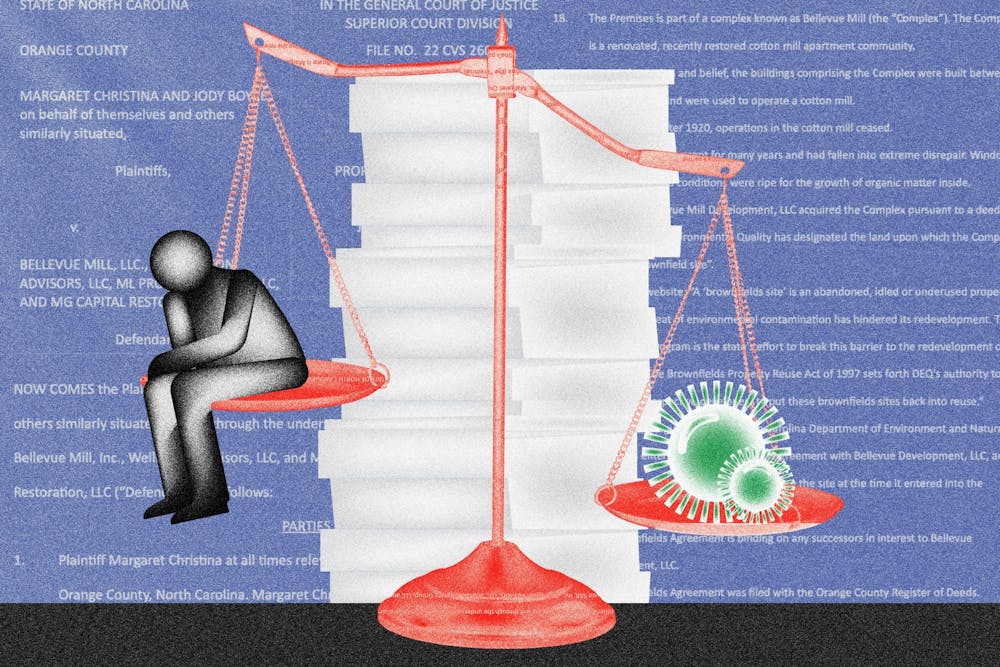"It takes a team to keep a building performing like it’s supposed to,” Lipton said. “Unfortunately, there’s not a lot of cooperation between all of those parties, and the relationships are complicated.”
Legal action
Christina and Boyce decided to bring a lawsuit against the apartment complex. Jamie Paulen, the founder of Paulen Solidarity Law in Hillsborough, is representing Christina and Boyce in the case.
The allegations include breach of contract, fraud, negligence and unfair and deceptive trade practice claims in addition to a minimum housing complaint. An amended complaint was submitted in October, according to Paulen.
ML Property Group, which now manages Bellevue Mill Apartments, denied the claims made toward themselves and Bellevue Mill Apartments in an email statement.
“The health and living conditions of our residents are our top concerns, and we are confident that the property complies with all applicable environmental and public health standards,” they said.
The other defendants named in the case — Wellington Advisors, which previously managed Bellevue Mill Apartments, and MG Capital Restoration — did not respond to The Daily Tar Heel's requests for comment by the time of publication.
Ambiguity about mold
Paulen, who specializes in landlord-tenant disputes, doesn’t typically take mold cases. Few attorneys do, she said, because they’re "difficult to win."
“There’s so much disagreement about mold and the nature of causation that there’s no laws that prohibit landlords from having mold in their units,” Paulen said.
Paulen said Chapter 42, Article 5, Section 42-42 of the General Statutes of North Carolina provides the closest legal protection for tenants. The statute requires landlords to do “whatever is necessary to put and keep the premises in a fit and habitable condition.”
Tristan Routh, a staff attorney at Carolina Student Legal Services, Inc., said there are many misconceptions about mold. Routh estimates he deals with between 50 to 100 mold-related repair issues each year.
To get the day's news and headlines in your inbox each morning, sign up for our email newsletters.
Through his job, he offers advice to UNC students living in off-campus housing about their rights as a tenant and puts pressure on landlords to make necessary repairs. In his eight-and-a-half years on the job, Routh said he has yet to see a case of deadly, toxic mold.
"Most of the time if there’s mold, it’s not good, but it doesn’t render the place uninhabitable," Routh said.
When Christina and Boyce determined mold was causing their symptoms, they asked ML Property Group to test for mold in their apartment.
Three months after Christina’s initial request, MG Capital Restoration was hired by ML Property Group to initiate remediation. According to the lawsuit, surface and air samples of the premises were never taken.
Christina and Boyce then hired Omega Safety and Environmental to take samples of the mold.
According to the lawsuit, Omega Safety and Environmental’s surface and air samples from Christina’s unit showed “dangerous levels of toxic mold.”
Routh said testing is one of the first things he advises people dealing with a mold issue to do. However, interpreting the results of mold testing is complicated, Routh said.
There is no public agency in North Carolina offering mold testing, he added, and third-party agencies are unregulated. The U.S. Environmental Protection Agency has also not named standards or threshold limit values for mold or mold spores.
'Don’t let them intimidate you'
One of the allegations in Christina and Boyce's complaint is that the property wasn’t graded to ensure proper water drainage according to Orange County's building code. This led to water intrusion and encouraged mold growth, according to the amended complaint.
Paulen said Orange County pressured the complex to fix the issue after the complaint was filed.
However, Bellevue Mill Apartments has over 100 units, and Paulen said the drainage surrounding most of them wasn’t touched.
“They’re spending a lot of money on defending this lawsuit, and they’re spending none of it actually trying to remediate the problems over there,” Paulen said.
According to Routh, the power imbalance between landlords and tenants is the main reason why legal matters such as mold are ambiguous and difficult to prove in court.
Many tenants can’t afford legal help, Routh said, which means there isn't much litigation about mold. Without litigation, interpreting laws is more difficult.
Paulen said the case is still early in the litigation process. Mediations are set to begin this month.
“For landlords, it’s just business as usual,” Paulen said.
Routh said he would love to see North Carolina adopt more specific statutes surrounding the responsibilities of landlords and the issue of mold. But, he said he’s doubtful the legislation will pass anytime soon.
House Bill 1012, which was introduced to the N.C. General Assembly in 2019, included language allowing tenants to declare a unit unfit in the presence of harmful “fungal growth." But the bill never made it to the state House floor.
For now, Routh said the most important piece of advice he can give tenants dealing with mold is to stand up for themselves.
“Your landlord has responsibilities,” Routh said. “They have duties. Don’t let them intimidate you.”
Christina said she does not plan to give up in the lawsuit against the apartment complex.
“I’ve got all the patience in the world. I’m not going anywhere,” she said.
Natalie Bradin contributed reporting to this article.
@DTHCityState | city@dailytarheel.com




